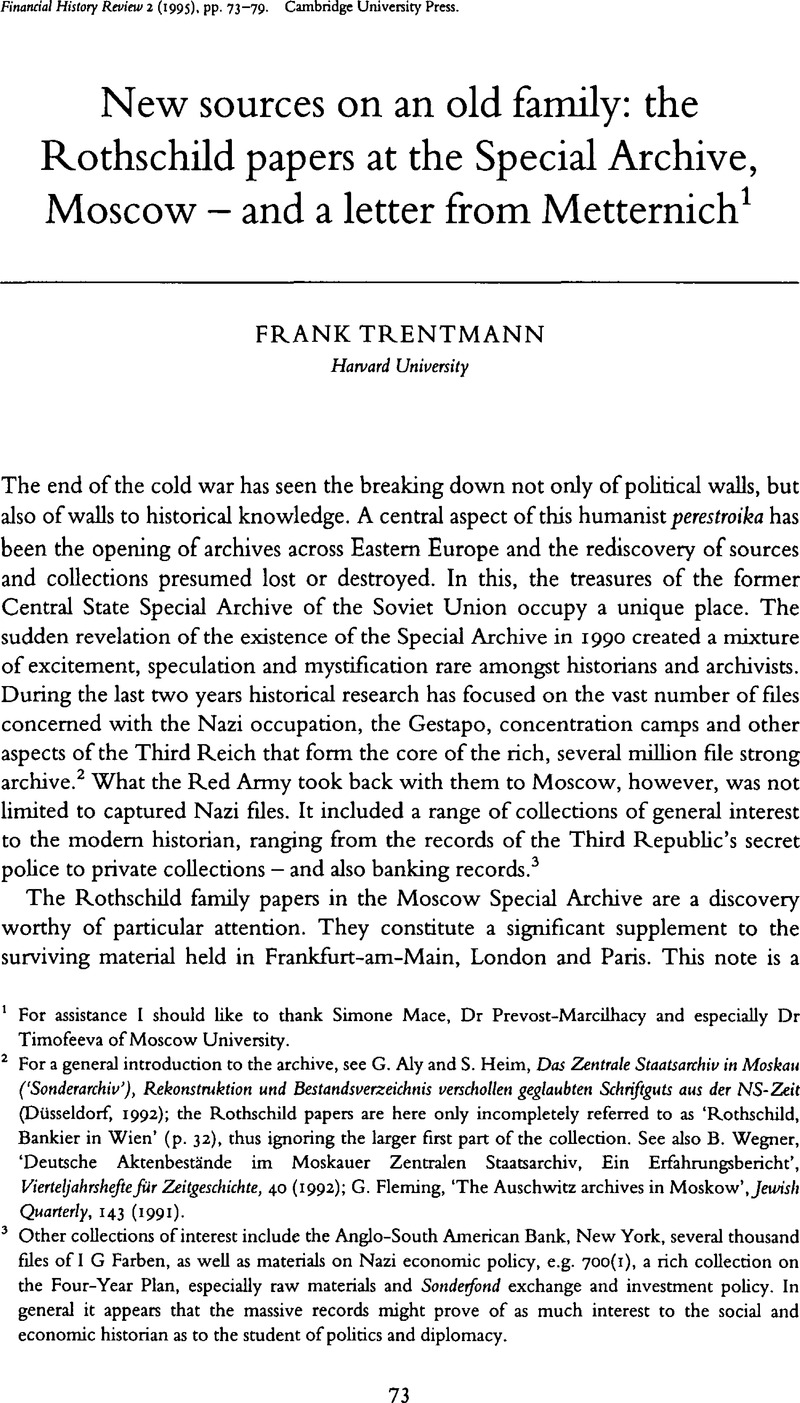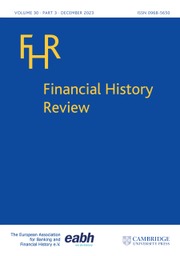Article contents
New sources on an old family: the Rothschild papers at the Special Archive, Moscow – and a letter from Metternich1
Published online by Cambridge University Press: 12 September 2008
Abstract

- Type
- Archive Surveys
- Information
- Copyright
- Copyright © European Association for Banking and Financial History 1995
References
2 For a general introduction to the archive, see Aly, G. and Heim, S., Das Zentrale Staatsarchiv in Moskau (‘Sonderarchiv’), Rekonstruktion und Bestandsverzeichnis verschollen geglaubten Schriftguts aus der NS-Zeit (Düsseldorf, 1992)Google Scholar; the Rothschild papers are here only incompletely referred to as ‘Rothschild, Bankier in Wien’ (p. 32), thus ignoring the larger first part of the collection. See also Wegner, B., ‘Deutsche Aktenbestände im Moskauer Zentralen Staatsarchiv, Ein Erfahrungsbericht’, Vierteljahrshefte für Zeitgeschichte, 40 (1992)Google Scholar; Fleming, G., ‘The Auschwitz archives in Moskow’, Jewish Quarterly, 143 (1991).Google Scholar
3 Other collections of interest include the Anglo-South American Bank, New York, several thousand files of I G Farben, as well as materials on Nazi economic policy, e.g. 700(1), a rich collection on the Four-Year Plan, especially raw materials and Sonderfond exchange and investment policy. In general it appears that the massive records might prove of as much interest to the social and economic historian as to the student of politics and diplomacy.
4 See especially the correspondence files for Henri, Philippe, Eugène and Guy Rothschild. I would like to thank Dr Prevost-Marcilhacy for showing me her list of this opus. The estates and collections of the family will be discussed in her ‘Les Rothschild Batisseures et Mécènes’ (forthcoming). On the French branch, see also Muhlstein, A., James de Rothschild, Francfort 1792–Paris, 1868: une métamorphose, une légende (Paris, 1981).Google Scholar
5 In 1810 the family business was worth 800,000fl., of which Meyer's share was 370,000. Christian Wilhelm Berghoeffer, who could still draw on richer sources in pre-war Germany, suggests that in the mid-1770s Meyer must have been worth between 100,000 and 200,000fl.; Meyer Amschel Rothschild, der Gründer des Rothschildschen Bankhauses (Frankfurt-a.-M., 1922), pp. 27ff.Google Scholar
6 I have excluded here the interwar files 354–357 of Adolf Rothschild, born in Berlin in 1906, the son of the businessman Wilhelm. Though a trained banker, he was not a member of the banking family. First in the oil trade, from October 1933 he was a director in the foreign department of the Office Cinématographique International, Paris. These files consist of letters to his parents during his time in the Schutzhaft-Lager Heuberg (summer 1933), application for French citizenship, and an interesting memorandum (9 Dec. 1938) on the civic, anti-totalitarian faith of the ‘Loge Goethe’ of which he was a member.
7 See also the financial letter 22 Aug. 1850 in this file; part of this file was transferred to Austria in 1960.
8 In 1822 Metternich secured a personal loan of 900,000 gulden, repayable over 12 years at 5 per cent: Palmer, A., Metternich (London, 1972), pp. 200, 215f.Google Scholar
9 Ritter von Srbik, H., Metternich, Der Staatsmann und der Mensch, vol. II (Munich, 1925), pp. 249, and 286ffGoogle Scholar. on the escape. For subsequent research on Mettemich in exile, ibid., vol. III, Quellenveröffentlichungen und Literatur eine Auswahlübersicht von 1925–1952 (Munich, 1954), pp. 180ff.Google Scholar
The difficulties in having the letter of credit delivered to Metternich were recorded in Fürstin Melanie's diary: Richard, Metternich-Winneburg (ed.), Aus Metternich's nachgelassenen Papieren (Vienna, 1884), vol. VIII, p. 11.Google Scholar
10 All emphases are in the original. Original spelling and punctuation has been preserved.
11 Metternich did not cross the Channel until 19 Apr. 1848, kept back by illness and fears of a Chartist revolution.
12 Metternich's idea of ‘bourgeois’ was, not surprisingly, limited. As he told his daughter, he was looking forward to ‘ein kleines Landhaus’ [country house] near Brighton or Richmond: ‘Ich werde dort ein ganz bürgerliches Hauswesen einrichten; Chandellier wird uns drei Gerichte auftischen und es wird mir Zeit übrig bleiben, einen Rückblick auf mein politisches Leben zu werfen’, 2 04 1848Google Scholar; Metternich-Winneburg, , Aus Metternich's nachgelassenen Papieren, vol. VIII, p. 143.Google Scholar
- 1
- Cited by


